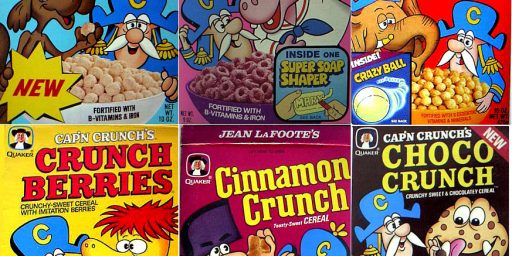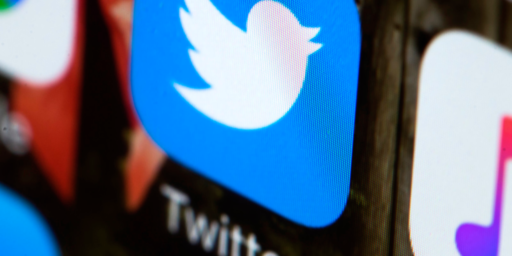Pepsi Cuts 8700 Jobs Despite Rising Profits
Pepsi's profits and revenues are up. Naturally, it's time to fire 3 percent of its global workforce.
Marion Nestle of Food Politics points to a sign of our times: “Pepsi cuts 8,700 jobs; 4th quarter profits rise.” He cites these numbers from a Reuters report:
Pepsi reports increases in:
- Annual dividends: 4%
- Expenditures on advertising: an additional $500 million
- Expenditures on display racks: an additional $100 million
- Fourth quarter profits: from $1.37 billion a year ago to $1.42 billion
- Earnings per share: from 85 cents a year ago to 89 cents
- Revenues: up 11% to $20.2 billion
Nestle rails at the juxtaposition of rising profits and “adding 8,700 out-of-work people to an already depressed job economy” and figures “public pressure and regulation” are in order.
Actually reading the linked report, however, presents a different picture.
PepsiCo outlined a plan on Thursday that included cutting thousands of jobs and increasing advertising in an effort to revive the company’s soft drink business in North America. The company’s chief executive, Indra Nooyi, said that it would have a larger-than-expected decline in near-term earnings.
PepsiCo, based in Purchase, N.Y., expects to cut 8,700 jobs, or 3 percent of its global work force, across 30 countries as part of a plan to save $1.5 billion over the next three years. It also plans to raise advertising and marketing spending by $500 million to $600 million this year, centering on 12 brands including Pepsi, Mountain Dew, Gatorade, Tropicana, Quaker and Doritos. It will spend an additional $100 million this year to improve delivery and display racks.
Ms. Nooyi, whose five-year tenure has been marred by the global financial crisis, recession and higher commodity costs, also took responsibility for a series of management missteps including underinvesting in some brands and overpromising Wall Street.
[…]
Ms. Nooyi has come under pressure from Wall Street for a stagnant stock price and a lagging North American beverage business. She has been criticized for taking her eye off the core business of sodas to expand into healthier products, such as hummus and drinkable oatmeal.
The company said its earnings in 2012 would decline 5 percent from 2011. It forecast an additional 3 percentage point decline from foreign exchange rates.
So, the 4% dividend boost is designed to bolster investor confidence and the company is actually down 5% from last year. And facing a 7% increase in commodity costs in the coming year. On the face of it, then, it’s perfectly reasonable that Wall Street would be putting pressure on the company to increase performance vis-a-vis its competitors (notably, of course, Coca-Cola) by getting rid of money losing distractions.
On the other hand:
PepsiCo reported a fourth-quarter profit of $1.42 billion, up from $1.37 billion. Earnings per share rose to 89 cents, from 85 cents a share in the same quarter a year earlier. Excluding items, PepsiCo earned $1.15 a share, topping analysts’ average estimate of $1.13 a share, according to Thomson Reuters. Revenue rose 11 percent to $20.2 billion.
So, while earnings for the year were down, earnings were up slightly from the same quarter. More interestingly, revenues were up fantastically even if profits aren’t. Presumably, that’s a function of the sales of such things as “hummus and drinkable oatmeal” bringing in a substantial amount of gross but netting very little or even losing money. Apparently, the money is in the established junk food brands “Pepsi, Mountain Dew, Gatorade, Tropicana, Quaker and Doritos.”
One of our recurring discussions on the late, lamented OTB Radio program was whether companies had an obligation, especially in tough economic times, to keep as many employees as revenues allowed. Should CEOs continue to seek maximum efficiency–cutting employees and marginally profitable departments and subsidiaries to wring out the last amount of profit? Or should they instead keep such things as a lagging drinkable oatmeal plant going so long as they can afford to?
Certainly, all the pressures on the CEO are in the direction of the former. That’s especially true of a huge corporation in a globalized economy, where the business really isn’t a part of the community in a meaningful way and has no sense of obligation to anyone other than the shareholder.
Story via John Personna. Business image via Shutterstock.







Drinkable oatmeal sounds awful.
So she’s firing 8700 workers to shovel more money at the ownership class. Yet another transfer of wealth from those who actually produce value to those who do nothing but acquire money and rig the system to keep themselves on top.
Yes, I know. Doug will now weigh in on how all those owners are really sweet little old granny ladies and pension plans who will immediately distribute their new dividends to the poor. And then the business-humpers will weigh in on how workers are disposable trash, and owners are the only people in society who have any worth.
Meanwhile almost 9000 people will worry about how they’re going to feed their families tomorrow so that a failed executive can try to hold on to her multi-million dollar paycheck by bribing rich people into loving her. Because that’s the glory of the free market.
Greetings:
If it’s one thing that I can’t stand, it’s those exploitive female, minority, person of color capitalists.
OCCUPY Purchase, N.Y. now. There’s plenty of room over by the Kensico Dam.
“One of our recurring discussions on the late, lamented OTB Radio program was whether companies had an obligation, especially in tough economic times, to keep as many employees as revenues allowed.”
Under a business model where companies have a certain amount of fat in their budget which can be trimmed in down times and then restored in good, the idea that they should be required to keep employees longer than necessary seems ridiculous.
But in a business model where EFFICIENCY has been elevated above all other economic factors combined, producing a world where companies are expected to never have any fat at all…?
Mike
Let’s not forget the classic “the only reason a business exists is to create profits.”
A company that can’t show loyalty to its employees, deserves no loyalty from customers.
Surely they have obligations to their customers and employees as well as their shareholders. They are, afterall the ones creating and buying the products and services that the shareholders are making money off of.
anjin,
That is the main reason a business exists. This isn’t a charitable endevour after all
Hey Republicans, this shows you the big corps are not the great job creators. They just take and take and well you know.
@Doug Mataconis: Doug everyone agrees businesses need to be profitable but the people who helped should be rewarded also. You just don`t get it why many people are angry. Our country is hurting and the ones in the position to help are actually making things worse.
People keep forgetting that corporation are instruments, tools created for the express purpose of making money. As such, I cannot fault Pepsi for following whatever legal and ethical business strategy they think will help them maximize their profit.
On the other hand, this reinforces (in my mind, at least) the notion that business should be well-regulated (and when I say “well” regulated, I don’t mean oppressively, but rationally and efficiently). They are not citizens, and they do not have consciences: there must be rules to the game.
Capitalism is ultimately unsustainable because the pressure to increase profits requires reducing costs which ultimately means reducing employees which in turn reduces demand which in turn means the further reduction in costs which means further reducing employees which in turn further reduces demand…and so forth.
Besides…Coke is much better than Pepsi.
From Morningstar, looks like state retirement systems will benefit from Pepsi’s move.
FYI, if you’re discussing or even planning to discuss whether a publicly-traded company has “an obligation, especially in tough economic times, to keep as many employees as revenues allowed,” then you’ve already jumped the shark tank and devolved into abject liberal idiocy.
Really? And you speak for all business owners everywhere? I had no idea you have that kind of juice. Certainly profit is the hub of the wheel, without out it a business will not survive unless you have an owner(s) with the means and will to run it break even or at a loss. And there are clearly a great many people who only care about making money and really don’t care about the details.
That being said, I know a lot of business owners who have motivations just as powerful, or more, than profit. The desire to build a better mousetrap. A genuine passion for the business they are in/the product or service they are selling.
The jazz club I hang out at has never made a dime. The owner works a day job, and runs the club because he thinks there needs to be a good venue for music in our area. I know I can see world class show 10 minutes from my front door, and that has a lot of value.
@Gold Star for Robot Boy:
Horchata (rice base) is good, so who knows … but still not everyone even tries the horchata.
More generally, I think the interesting thing is not so much the “employees or advertising” choice, but that they can make that choice. If this is to reconfigure the core business, they found a way to run it with less people. Should we guess more automation?
I still believe in creative destruction, but worry now in the new century how much it was a happy accident that so much creativity was jobs-creating in the last century. Well, my thoughts were shaped by a related Walter Mosley interview via Marketplace.
Sure, businesses must be profitable, and have the right to seek efficiency. It isn’t really their fault that their actions become part a trend and perhaps affect a whole cohort of wage earners.
As aside, Food Politics comes up with a lot of good stuff.
@anjin-san:
Wasn’t the old story that National Review had never turned a dime, and that when an advertising shake-up was predicted to turn a profit, WFB was somewhat offended?
Sure, people can run businesses for all reasons. But we can’t really restrict the right to seek efficiency, for those who choose, without without forcing inefficiency.
Which brings us back to a safety net, and robo-socialism.
i really don’t see the problem here. a company can hire and layoff whoever it wants.
@Doug Mataconis:
If full-employment is a social goal (and in the U.S. it is because we have laws on the books requiring it) then it is the responsibility of government to make it happen, not a corporation. If Nooyi doesn’t please shareholders they’ll fire her ass, and it’s that simple. Expecting her to do anything other than maximize profits is fantasy.
I still believe in creative destruction, but worry now in the new century how much it was a happy accident that so much creativity was jobs-creating in the last century.
If I remember correctly, Schumpeter thought that ‘creative destruction’ was necessary for a form of true socialism to emerge as it completely destroyed whatever was positive about capitalism. In America, all consumables are drained of their doom, but it’s fairly amusing whenever this term is trotted out–as well as Schumpeter–as something idea about our system.
The real question is whether running corporations for the sake of the shareholders (e.g. institutional investors) has been beneficial to anyone aside from executives, the financial industry and those with enough wealth in the bank for serious returns.
If corporate shareholders bore all the risk of the company they own, I would agree that corporations have no duty but to their own profit. As it is, though, their risk is limited to the money they put in, above and beyond that is distributed across society by limited liability.
After all, those who take the risk should share the reward. Free market, after all.
@Modulo Myself:
Yes, Wikipedia has a good summary. I think what’s interesting is that we did have many decades, possibly centuries, of destruction and growth. We did have high employment in each growth phase.
The conservative position (in both senses of the word) would be that we’d have regression to the mean. It is calling “this time is different” a bit (and therefore quite risky) to propose that the game is permanently changed.
That said, I did read Nicholas Kristof’s take on Charles Murray this morning. He channels the “changed world pessimism:”
@john personna: I agree. There are things we can do through government policies without crafting large new bureaucracies or provoking malinvestment by picking “winners and losers”. Will we? Not a chance.
@Hey Norm:
That must be why capitalism has lasted so long and has brought wealth and prosperity to all. True more to some who took more risk but everyone in capitalist societies live better than the wealthiest in the 17th century.
@Barb Hartwell:
Sure the employees help and they were paid for their work. We know this because if you don’t meet your payroll, you end up in a lot of trouble with the regulators. Now you are saying that even though the employees had no stake in the profit risk they should still get some of the profit. Would you then agree if a company is in the red, the employees should not take some portion of the pay they are owed?
As a person who frankly consumes too much hummus and oatmeal, I have to ask: who ever thought drinkable oatmeal was a good idea?
Christ. Earth to nestle, and some commenters. Don’t you get it. Profits and employment are not correlated. People will quit Pepsi if it fits their own goals and objectives. Pepsi will quit employees if it fits their own goals and objectives.
All the rest are empty words. Grow up.
Sadly, the goals and objectives of too many corporations are buying an island payouts for a handful of people and to hell with everything else. Once upon a time we had boards who took their duties seriously and they prevented this nonsense for the most part, but those were the good old days.
Pepsico allowed a children beverage containing dishwasher detergent to be sold in Brazil. No wonder that their shares are stagnant.
I had not heard about that. I do know that they turned Taco Bell, an outfit that used to turn out pretty good food at a reasonable cost, into a purveyor of crap that resembles sawdust more closely than food. Have a mock meat burrito and enjoy…
As household budgets get tight, the junk food purchases should decrease. Seems predictable.
@John P.
I’m not convinced having an entire nation of highly skilled workers would make much difference. Looks like “Player Piano” to me. Kurt thought it would be machines that increased productivity to the point where there wouldn’t be enough jobs for people. Close enough. Computers are machines.
I don’t have a problem with a company letting go who it wants when it wants. Particularly, if as this seems to imply, they just eliminate positions through regular attrition. But any kind of move like this carries a pretty high hidden cost in that now your employees are less enthusiastic, less loyal and a little more likely to look for greener pastures. The most talented are usually among the first to go. I’ve seen this kind of thing go into a death spiral hard to get out of (not saying it will here yet.)
This seems kind of an insane thing to do when the business is doing well, but just not as well as hoped. Rather than increasing dividends, it seems it would be better to re-invest in the business; increased advertising is hardly a bad thing, display cases maybe (I’m not in marketing), product improvement and research anyone?
In an ideal world, now any employees actually let go or layed off would take their expertise elsewhere; some to competitors and some to start up new small businesses, and Pepsi would have an even harder time competing.
Unfortunately, in our pro big corp (screw everyone else) world, they are probably just out of luck.
@Gold Star for Robot Boy: Actually, cereal milk is really tasty. We have it in Korea. Denmark Milk sells it where I live and their version has seven grains along with the milk, nutmeg and the special secret ingredient–sugar!
Only slightly more substancial than whole milk and more like kefir than actual oatmeal, but tasty just the same.
@Barb Hartwell: That’s because in Doug’s world, employees are simply “takers.” It is only the investors and Officers that are “:makers.”
I’d be willng to bet Pepsi, among other multinaionals are worried about this:
http://globaleconomicanalysis.blogspot.com/2012/02/petroleum-3-month-rolling-average-turns.html?utm_source=feedburner&utm_medium=email&utm_campaign=Feed%3A+MishsGlobalEconomicTrendAnalysis+%28Mish%27s+Global+Economic+Trend+Analysis%29
Maybe Pepsi should cut their prices. It is simply outrageous what I am paying for a 2 liter soft drink, including Pepsi products: close to $2 and getting closer by the week. I am also paying almost $4 for a bag of chips and $3 for a package of candy bars! This is a disgrace. The government needs to investigate these price increases and get tough. Today it was $1 for 1 onion and $2 something for 2 tomatoes! Why isn’t Congress doing something? Nothing mentioned about this in the president’s so wonderful state of the union speech. Is this because of all of the money that the government is now printing and spending like crazy?
Perhaps more people would be staying in jobs longer, if government hadn’t created the situation where keeping people on the payroll was not so damned expensive?
@Eric Florack: The Pepsi cuts are coming from 30 different countries, so unless the U.S. government regulates their economies too, this ain’t about government interference.
Use your freaking brain and read the damned post for once.
@Carson: Most of the inflation we’re experiencing is coming from oil prices which will not fall unless demand declines. That unfortunately would require another recession. Oil prices will become increasingly problematic over the next decade as supply remains stagnant and the costs of retrieving it continues to rise.
There are things we can do to help people bear rising costs, but that would require government spending, and the extreme right simply won’t have it.
Are the corporate executives consuming all the savings from the elimination of 8700 jobs? If so then this doesn’t help the stockholders at all.
20 oz. Pepsi: $1.50 at local store. Drink and popcorn: $18 at movie theater. Big Mac meal now over $5: Outrageous.
As someone with a 401k, I have an interest in the companies in my portfolio turning a profit. This isn’t ONLY about payroll, but rather the overall impact of having a profitable company.
Being an employee of Frito-Lay I can personally tell you that Frito-Lay pulls in 70%, and, sometimes more, of Pepsico’s entire income. Pepsi as it is, is running on skin and bones and now the lay-offs have run into Frito-Lay. I think it’s hilarious they mention Coca-Cola. While Coke is notorious for not being the most moral of companies, they’re business ethic is better than Pepsi which why they’re outsold year after year. That ethic is simple: what can we do to push sales? What can we do get more sharepower? They are competative and do it properly. Pepsi’s business plan? What can we do to save money? Where can we cut spending? It’s awful and all Pepsi does is lose money for the company overall.